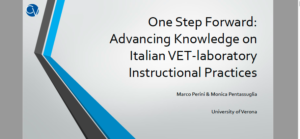Reflections on #ECER2018 – Part Three: The VETNET network in dialogue with the host country
With my previous posts I started a series of blogs on the European Conference of Educational Research (ECER 2018) that took place last week in Bolzano/Bozen. In the first post I reported on the pilot with ePosters powered by the digital toolset Learning Toolbox (LTB). In the second post I gave an overview on my own contributions – on the research background of the LTB and on ‘transfer of innovation’ issues in recent and earlier innovation projects. I also reported on my own way to prepare ePoster-versions of my presentations. In this third post I will focus on the traditional Opening Session of our VETNET network (European Vocational Education and Training Research Network). Ever since 1999 we have had a tradition to bring forward research issues and/or policy issues from the host country of the conference. Below I will give a brief report on the Opening Session in Bolzano-Bozen and on the issues that came up. Then I will make some remarks on the presentations of our Italian colleagues.
Issues on Vocational Education and Training (VET) in the host country and host region
Already in the preparation phase our Italian colleagues had advised that we should focus on the host region (South Tyrol/ Trentino Alto Adige) as a bilingual region in which two lingual communities live in the same neighbourhood. Following this advice the VETNET network was pleased to welcome representatives of Vocational Education Institutions/Authorities from German-speaking community and the Italian-speaking community. In addition we were pleased to welcome a representative of the German-speaking Trade associations and an Italian researcher as a discussant.
Without going into details of the presentations it is worthwhile to not that the representatives of vocational education from both lingual communities emphasised the efforts of vocational schools to incorporate workplace-based learning into their provisions. Partly this was pursued via local partnerships, partly with the help of regional ESF-projects. Yet, both speakers expressed their concerns of high drop-out rates (although the regional drop-out rates were lower than the average in Italy). In this context the representative of the trade association (entrepreneur himself) expressed his critical views on the bridging arrangements initiated by vocational schools. His association was strongly in favour of the German-like dual system of apprenticeship in which the enterprise is the major partner and the school has a supporting function. He then presented a lively picture of achievements reached (and hurdles met) in making the apprentice training function in the regional context. With these introductory presentations we got a richer picture of the host region in which the lingual communities follow different cultural traditions in shaping the VET provisions and are on somewhat different developmental paths. Due to many questions and comments the session chair had to reschedule the discussant’s contribution (prepared by Marco Perini) to the next session (see below).
Italian research papers in further VETNET sessions
We already go interested in the VETNET Opening session and luckily enough we had informative contributions from our Italian colleagues who could give us deeper insights. Unfortunately I couldn’t attend their sessions but luckily enough we find their papers in the ECER VETNET Proceedings 2018 (that have been published immediately after the conference. In this respect I just try to give a brief background information on the contributions that I recommend for further reading.
Marco Perini et al.: Research on Italian VET-laboratory instructional practices
In the VETNET Opening Session we had already heard several speakers referring to “VET-laboratories” as joint learning arrangements developed by vocational schools and regional enterprises. In their presentation “One Step Forward: …” Marco Perini and Monica Pentassuglia provided firstly background information on the Italian VET system and on the introduction of this new format for collaborative learning. Based on the background information they outlined a research framework for studying the implementation of this approach and getting feedback from different parties involved. Since the paper gives insights into work in progress, we are keen on following the further steps of the study.
Paolo Nardi et al:: Case study on the Oliver Twist school as example for new approach in VET
The paper of Paolo Nardi and his co-authors can be characterised as ‘college research’ and as ‘action research’ in a vocational education and training setting. Cometa – the training institution – is carrying out a quality development campaign with which it wants to evaluate the vocational programs and certify them with Cometa branding. In this context the ‘reality-based learning’ approach is given a major attention. Whilst the teachers are engaged with developmental process, Cometa Research team is supporting the process with documentation and analyses. The paper presents both the approach, developmental measures (concerning internship/apprenticeship) and achieved results. The interesting point here is that the Cometa Research activities are being developed as a continuing support layer – both for the school development and teachers’ professional development and for cooperation with partner universities.
—
I think this is enough of the VETNET opening and on the dialogue that was opened with the host region and the host country representatives. I am looking forward to the next steps and next encounters. But I also need to give an account on other themes discussed in the conference.
More blogs to come …


